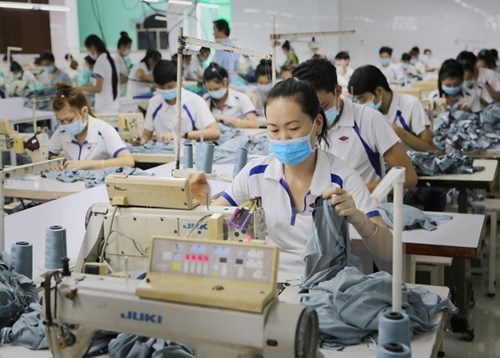The foreign-invested sector enjoyed a trade surplus of USD 23.65 billion, but growth fell to 15 percent year-on-year compared to 23 percent growth in the first quarter due to difficulties finding export markets, the report noted.
The domestic sector reported a trade deficit of USD 18.26 billion in the period, but its exports experienced an encouraging increase of 17.5 percent year-on-year to USD 51.07 billion, higher than 15 percent jump posted in the first quarter.
    |
 |
|
Vietnam records a trade surplus of USD 5.39 billion in the first nine months of 2018. |
The domestic sector’s positive export performance had contributed to a yearly rise of 15.4 percent in the country’s nine-month export turnover of over USD 178.9 billion, nearly double the growth target set for the whole year by the National Assembly, GSO Director Nguyen Bich Lam said.
According to the report, 26 export commodities brought in more than USD 1 billion in export value from January to September, making up 90.3 percent of the country’s total export revenue.
Five of them grossed a revenue of more than USD 10 billion, accounting for 58.2 percent of the total export value, including phones and accessories with USD 36.1 billion, up 15 percent; textiles and garments (USD 22.6 billion, up 17.1 percent); electronic products, computers and components (21.6 billion USD, up 17 percent); machinery, equipment and parts (USD 12.1 billion, up 29 percent); and footwear (USD 11.8 billion, up 11 percent).
However, crude oil exports witnessed sharp declines in both value and volume compared to the same period of last year, standing at USD 1.7 billion, down 25 percent in value despite an average increase of 38 percent in global crude oil prices.
In the January - September period, the US remained Vietnam’s biggest export market, spending USD 34.9 billion on Vietnamese goods, up 13 percent year-on-year, followed by the EU (USD 31.1 billion, up 10 percent) and China (USD 28.1 billion, up 27 percent).
The country’s import value of commodities in the period saw a modest surge of 12 percent to USD 173.52 billion. Of the sum, the foreign-invested sector contributed USD 104.2 billion, up 12 percent, while the domestic sector made up USD 69.34 billion, up 11.7 percent.
Key import items included electronics, computers and components, equipment and machinery, telephones and components, fabric, iron, steel, plastics, oil and gas, metal, footwear, chemicals, and garment and textile materials.
China remained Vietnam’s largest import market during the period with turnover of USD 47.1 billion, a 12.5 percent climb year-on-year. The Republic of Korea came next by exporting USD 35 billion worth of goods to Vietnam, a rise of 1.4 percent year-on-year, while ASEAN countries ranked third with USD 23.2 billion, up 13 percent.
Source: VNA